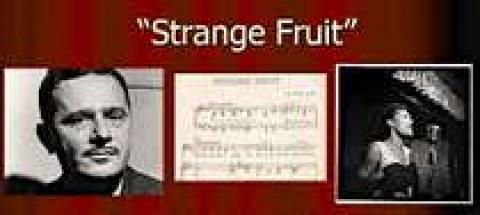[Listen to the performances of Strange Fruit by Billie Holiday and Nina Simone -- moderator.]
This Thanksgiving, I’m thankful for Strange Fruit.
My adoptive father, Abel Meeropol, wrote the words and music to Billie Holiday’s signature song, Strange Fruit. Abel, a high school English teacher with a passion for writing, reacted to a gruesome photograph of a lynching in late 1936, with a poem entitled “Bitter Fruit.” In 1937 or 1938 he set the poem to music and changed the title. Billie Holiday did not perform it until 1939. Strange Fruit was the composition my father was most proud of, but one that he never lived with easily. In 1940, Abel was called before New York State’s Rapp-Coudert Committee, a legislative commission attempting to root out communist teachers, and asked if the Communist Party ordered him to write the song.
Later, Billie Holiday claimed in her ghost-written autobiography that she set Abel’s poem to music. To this day you can find online references to Strange Fruit that attribute its words to Abel Meeropol and music to Billie Holiday. Growing up in the Meeropol household I witnessed Abel’s frustration at his inability to correct this misperception.
But Abel was even more troubled by the song’s eclipse. It was widely recognized in the 1940’s, but in the great red scare of the 1950’s, it almost disappeared from the public arena. In fact, by the time Abel died in 1986 the song had faded into relative obscurity. This was one of Abel’s biggest regrets.
But the strange fruit allusion - lynched bodies hanging from trees – was one of genius. It had gotten under our culture’s skin, and as time went on, it seeped out of its pores.
The song’s rebirth was slow at first, recorded out of the country or at the edges of acceptability. The Jamaican group UB40 taped it in 1980. Sting performed it on an album celebrating Amnesty International’s 25th anniversary in 1986, and the punk group, Siouxsie and the Banshees, followed suit in 1987. Cassandra Wilson introduced Strange Fruit to a new generation in her widely acclaimed debut album in 1995. In 2000, Time Magazine named it the “song of the century” and Daivd Margolick’s book, Strange Fruit, Billie Holiday, Café Society and an Early Cry for Civil Rights, sold well. That was followed by Joel Katz’s film documentary about the song, in 2002.
David Margolick wrote that although Abel wrote Strange Fruit, he was best known for adopting my brother and me. I don’t know if that was ever the case, but it certainly has not been so for the last decade. Nowadays there are more online references to Abel Meeropol as the author of Strange Fruit, who “by the way,” also adopted the son’s of Julius and Ethel Rosenberg, than to any other member of our family.
2013 has seen the Strange Fruit concept, explode. Kanye West’s sampling of Nina Simone’s version in his Yeezus CD made it an internet sensation. Almost every week I hear about new recordings, concert performances, musicals, dances and even art exhibits inspired by the song. The November 20th episode of the TV series Criminal Minds, which ironically features heroic FBI agents, was entitled “Strange Fruit.” It has even been used as a verb. To “strange fruit” someone, is to do what George Zimmerman did to Trayvon Martin.
Close to 80 years after Abel wrote those 97 potent words (that’s right, the entire song contains less than 100 words), the pot is in full boil. I am so thankful for Abel’s brilliant creation because Strange Fruit’s growing power gives me hope. The pen just could be mightier than the sword after all.


Spread the word